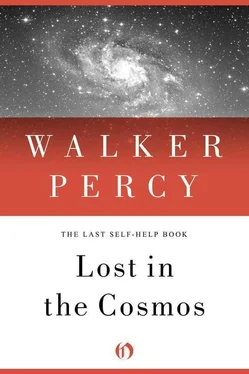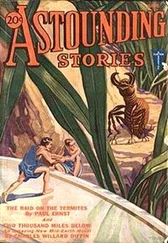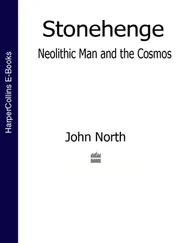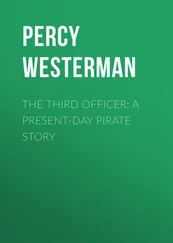At last, five years later, near Proxima Centauri, communication was established with an extraterrestrial intelligence. Orbiting the third planet of Proxima Centauri (PC3), of PC’s twelve planets the one most resembling Earth, the earthship transmitted the prime numbers in the radio range of the electromagnetic spectrum. Almost immediately, the signal was returned — and imitated. But when the excited earthlings tried to descend, a glitch occurred in the controls, not once, but repeatedly — until it finally dawned on the crew that they were being held in orbit. Evidently, the earthship was being detained at a kind of checkpoint until its credentials were approved.
It was necessary to hit upon a mathematical and semantic vocabulary. The former was easy, again using the physical properties of the hydrogen atom, assigning the binary number 1 to the transition between the parallel and antiparallel proton and electron spins of the neutral hydrogen atom. Such a transition emits a radio-frequency photon of wavelength 21 centimeters and a frequency of 1420 megahertz — the reason for selecting this channel of transmission. An indexical lexicon was agreed upon. Thus, certain binary numbers were assigned to the suns of Centauri by transmitting the number along with the angle or declination of the suns from the path of transmission. Similarly, other names were assigned to other features, the other referents being “pointed at” and “named,” e.g., light, dark, other planets, pulsars, big, little, red, blue, near, far, down, up, here, there, I (the earthship), you (PC3), and so on. Plurals and abstractions and tenses were agreed upon. Goodness was a property attributed to cosmic particles which were beneficial to the metabolism of the PC3 organisms, evil to the ultraviolet rays, which were harmful. Even metaphor was arrived at: I am M4 today, meaning I am your fourth moon, PC3's fourth moon being bright, small, racy, refractile as a diamond. Or I am M6 —sluggish, blue, misshapen, bored. Consciousness was defined as that property of a creature by which he draws attention to something, talks about it, or thinks about it. It was designated by a binary number which we shall call C.
A lexicon and syntax agreed upon, it was now possible for the earthship to transmit basic information about its origin, its sun, the geology, atmosphere, age of the planet earth, the biology of its organisms (e.g., C, H, O, S, H 2O, PO 4; deoxyribonucleic acid; mobile heterotrophs; surface dwellers; O 2breathers; sexual mammals, etc.), its technology (nuclear energic), its culture (two hundred nation-states, five global powers, sporadic brushfire warfare, environmental pollution), its science, its art (literary, iconic, musical) — a message ending with a sign-off and an invitation: Over and out — come back.
There followed a long pause, then an explicit warning: Maintain orbit until certain questions are answered —then the transmission of a binary symbol which the earthlings translated as something like the Hebrew shalom —then the transmission of comparable summary of PC3 information, indicating an organism with a bromine metabolism, an older civilization than that of Earth, and a superior technology (exponentiating, approaching asymptotic limit). Culture: global, gregarious, 40,000 genera, one symbolic language (!) (cf. Earth’s thousands), reproduction: sexual (!), biology: non-senescent (!): did that mean they did not age or die?!???; art: mathematical-poetic.
There then followed several transmissions from PC3 which the earthlings did not understand. They were
T, Si → Sy = 1.35 × 10 12years (breakthrough)
Si = atmospheric wave motion, tactile, radar return
Sy = variable pitch frequencies combined with radar-return configurations, or SRs (sound-radar)
Sn = SR, + SR 2(+ = assert)
C = 1 (Int, Soc, Sy)
Each item of information was followed by the query: “What’s yours?” Then: “What’s your C-type? Are you C1? C2? C3? Over and out. Come back.”
A puzzled silence from the earthship transmitter, then: “Say sgain.” Then: “Say again longer [i.e., Explain]. What is C-type? What is Si? Sy? Si ? Sy breakthrough? T? Sn?
After many weeks of transmissions, dogged human effort, and an unflagging good-humored patience from the PC3 transmitter, the following explanations were spelled out:
T = time
Si = sign
Sy = symbol
Sn = sentence
T, Si → Sy 1.35 × 10 12years means how long ago in PC3 years we made the breakthrough from sign communication to symbol communication, i.e., 13,500,000 years.
Before that, we communicated by touch, sounds of different pitches, and a radar-like reception of reflected sound. Like a bat, said an earthling. Imagine bats flying blind and emitting squeaks of different musical pitches.
Sy, or symbols, were formed by combining frequency clusters (e.g., chords of musical squeaks) with the percept or radar configuration formed by the radar-return of this or that object. Thus, instead of the word ball being applied to the round thing you earthlings play with, our primitive word was applied to the jagged radar-configuration of the double-bladed sickle with which our ancestors harvested our atmospheric algae. Our “words” or symbols are combinations of musical chords (for objects), arpeggios (for action words, verbs) with the corresponding radar percepts, just as your words ball, yellow, slice are combinations of sound configurations and visual percepts (though we don’t quite understand what you mean by “visual” and “see”).
Sn is a sentence, uniting two of these sound-radar configurations, so:

means: Your spaceship is descending.
EARTHSHIP: True. Very interesting. We read. Request permission to land. We could exchange much more information by meeting and talking.
PC3: Not quite yet. You haven’t answered our question about C-type.
EARTHSHIP: What do you mean by type of consciousness?
PC3: We are C1s. We wanted to know whether you are C1s or C2s or C3s.
EARTHSHIP: What is a C1?
PC3 (patiently) : We told you. C = 1 (Int, Soc, Sy).
EARTHSHIP: What does that mean?
PC3 (patiently) : It means that in order for the individual consciousness to be activated, it is required that there be a Soc, that is, a society, that is, two or more persons; an exchange of Sy, that is, symbols; and an Int, that is, an intersubjective relationship in which there is agreement about the symbol used and the thing that is talked about.
EARTHSHIP: Oh.
PC3: And you?
EARTHSHIP: We’re much the same. Now may we request permission to—
PC3: Just a moment. It is still necessary to establish your C-type. We are C1s, that is, first-order consciousness. Through the centuries we have learned by painful experience that there are at least two other C-types, C2s and C3s. C1s and C3s are benign. C2s are dangerous. Which are you?
EARTHSHIP: Say again. What’s the difference?
PC3: A C1 consciousness is a first-order consciousness, or what you would call a preternatural consciousness — according to the dictionary your computer transmitted.
EARTHSHIP: It is? Say again. Preternatural?
PC3: Well, something like the consciousness of a child grown mature and sophisticated but maintaining its innocence permanently and avoiding the malformations of self-consciousness, enjoying the beauty of our planet and each other and our science and art without weariness, boredom, fear, guilt, or shame. Like what you call the Helen Keller phenomenon.
EARTHSHIP: How do you know about her?
PC3: One of our cosmological linguists just arrived. This is he speaking. We’ve been monitoring you for years. Switch to Earth-L, English-speaking? German? French?
Читать дальше













